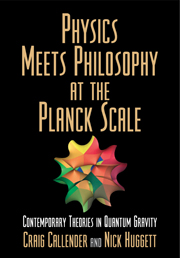Book contents
- Frontmatter
- Contents
- Preface
- 1 Introduction
- Part I Theories of Quantum Gravity and their Philosophical Dimensions
- 2 Spacetime and the philosophical challenge of quantum gravity
- 3 Naive quantum gravity
- 4 Quantum spacetime: What do we know?
- Part II Strings
- Part III Topological Quantum Field Theory
- Part IV Quantum Gravity and the Interpretation of General Relativity
- Part V Quantum Gravity and the Interpretation of Quantum Mechanics
- References
- Notes on contributors
- Index
3 - Naive quantum gravity
Published online by Cambridge University Press: 15 December 2009
- Frontmatter
- Contents
- Preface
- 1 Introduction
- Part I Theories of Quantum Gravity and their Philosophical Dimensions
- 2 Spacetime and the philosophical challenge of quantum gravity
- 3 Naive quantum gravity
- 4 Quantum spacetime: What do we know?
- Part II Strings
- Part III Topological Quantum Field Theory
- Part IV Quantum Gravity and the Interpretation of General Relativity
- Part V Quantum Gravity and the Interpretation of Quantum Mechanics
- References
- Notes on contributors
- Index
Summary
Introduction
The world of classical, relativistic physics is a world in which the interactions between material bodies are mediated by fields. The ‘black body catastrophe’ provided the first indication that these fields (in particular the electromagnetic field) should be ‘quantized’. Modern field theory contains quantum field–theoretic descriptions of three of the four known interactions (forces) – all except gravity. It is characteristic of the theories of these three forces that the values of the fields carrying the forces are subject to the Heisenberg uncertainty relations, such that not all the field strengths at any given point can be specified with arbitrary precision.
Gravity, however, has resisted quantization. There exist several current research programmes in this area, including superstring theory and canonical quantum gravity. One often comes across the claim that the gravitational field must be quantized, and that quantization will give rise to a similar local uncertainty in the gravitational field. Here we will examine this claim, and see how the very things that make general relativity such an unusual ‘field’ theory not only make the quantization of the theory so technically difficult, but make the very idea of a ‘fluctuating gravitational field’ so problematic.
What is a field?
Maxwell's theory of electromagnetism describes the interaction of electrically charged matter (consisting of ‘charges’) and the electromagnetic field.
- Type
- Chapter
- Information
- Physics Meets Philosophy at the Planck ScaleContemporary Theories in Quantum Gravity, pp. 90 - 100Publisher: Cambridge University PressPrint publication year: 2001
- 1
- Cited by

